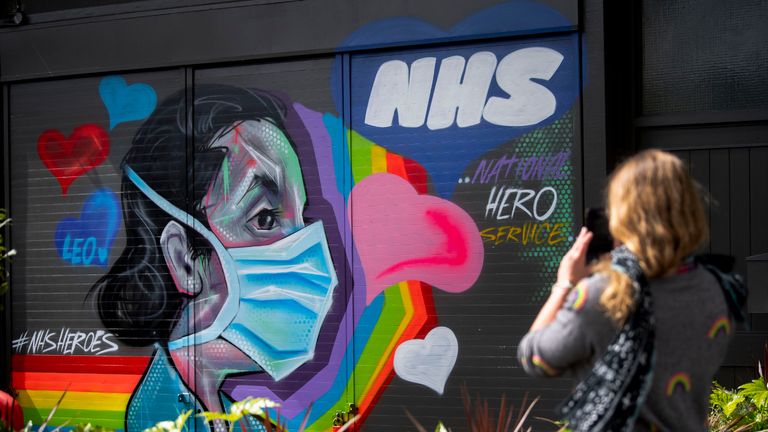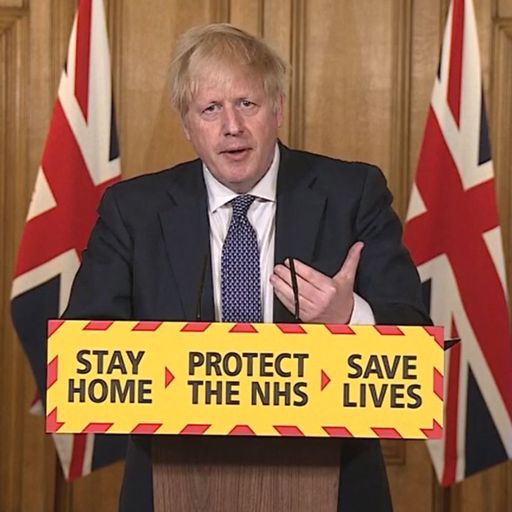Coronavirus: PM to deliver 'a menu of options' for easing the lockdown next week
The prime minister says the UK has reached the peak of infections as he promises to set out plans for lifting lockdown measures.
Friday 1 May 2020 07:14, UK
Boris Johnson says he will deliver a "comprehensive plan" next week on how the lockdown could be eased.
Declaring the UK is past the peak of coronavirus infections, the prime minister said he would be setting out a "road map, a menu of options" which could see looser restrictions.
However, he warned that any easing of the measures, which have been in place since 23 March, should not risk a second peak of infections that could overwhelm the NHS.
Speaking at his first Downing Street press conference since being admitted to hospital with COVID-19, Mr Johnson said: "I will be setting out a comprehensive plan next week to explain how we can get our economy moving, our children back to school and into childcare, and thirdly how we can travel to work and make life in the workplace safer.
"In short, how we can continue to suppress the disease and at the same time restart the economy."
The easing of individual restrictions would depend on "where we are in the pandemic" and what the data suggests.
But, the prime minister cautioned, "it is vital that we do not now lose control and run slap into a second and even bigger mountain".
Mr Johnson said that to "avoid the disaster" of a second spike in infections, the government would do "nothing" that risks lifting the "R" - or reproduction rate - of the virus back above one, which would mean each infected person was passing on the disease to at least one other person.
As well as risking more deaths, the prime minister said a second spike would cause "lasting economic damage" to the UK.
:: Listen to the All Out Politics podcast on , , ,
England's chief scientific adviser Sir Patrick Vallance has said there still needs to be a decrease in the number of hospital admissions across each English region.
But he added: "The number of new cases is down, that's turning into fewer admissions, fewer people in hospital, fewer people in intensive care and we're beginning to see that decrease in deaths."
Mr Johnson also lauded the country's efforts, saying: "At no stage has our NHS been overwhelmed, no patient went without a ventilator, no patient was deprived of intensive care.
"It is thanks to that massive collective effort to shield the NHS that we avoided an uncontrollable and catastrophic epidemic where the reasonable worst-case scenario was 500,000 deaths."
There have been 26,711 coronavirus-related deaths in the UK, with a further 674 deaths reported on Thursday.
This now includes those who have died outside hospitals.
With the government having set a target of conducting 100,000 coronavirus tests per day by the end of April, the prime minister revealed 81,611 tests had been carried out on Wednesday.
Due to a lag in reporting, it is not yet clear whether the government managed to reach its target.
The government has been criticised for having "emaciated" the system which would have allowed it to carry out more extensive testing.
Public health professor Gabriel Scally, referring to the Conservatives' austerity measures, told BBC Newsnight: "The resilience has been stripped systematically out of the system. You cannot, when a big problem like this hits, you can't just reinvent things and put them back the way you wish they were."
Other experts have dismissed the target as "arbitrary" and a "PR stunt".
Testing is critical to a country's pandemic response and the World Health Organisation has urged countries to take part in rigorous testing.
Meanwhile, Mr Johnson dismissed suggestions that further austerity cuts to government spending could be made in the aftermath of the pandemic.
"I think the economy will bounce back strongly, I think that this government will want to encourage that bounce back in all kinds of ways," he said.
"I've never particularly liked the term [austerity]... and it'll certainly not be part of our approach."









